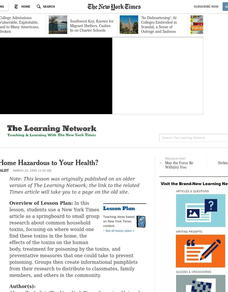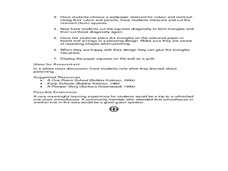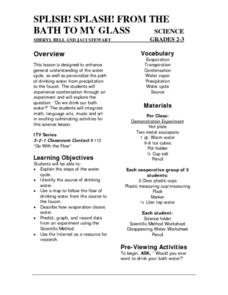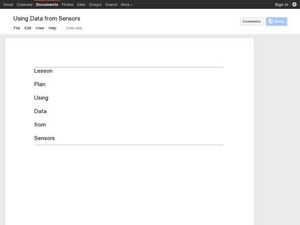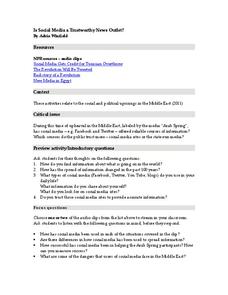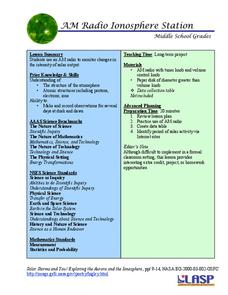Curated OER
Currents Challenge
In this science worksheet, learners read the article related to currents and complete the exercises that are multiple choice and short answer.
Curated OER
Too Much of a Sweet Thing
Young scholars examine the growing prevalence of processed sugar in the American diet, first through a demonstration that makes graphically clear the amount of sugar an average boy and girl consumes on a daily basis.
Curated OER
Is Your Home Hazardous to Your Health?
Young scholars use a newspaper article as a springboard to small group research about common household toxins, focusing on where would one find these toxins in the home, the effects of the toxins on the human body and treatment for...
Curated OER
Schoolhouses
Fifth graders research life in a one- room schoolhouse. They plan and carry out a mock day in a one-room schoolhouse. They make slates on a prior day by painting small boards with chalkboard paint.
Curated OER
Suited for Space
A fantastic lesson on survival in outer space should excite your learners! Pupils explore the challenges that living, working, and surviving in space elicit. They focus on the spacesuit itself; how it protects astronauts, and enables...
Curated OER
Splish! Splash! From the Bath to my Glass
An excellent lesson on the water cycle! In it, learners should gain a general understanding of the water cycle, along with how water first falls as precipitation, then ends up coming out of our faucets. This lesson nicely integrates...
Curated OER
Arbor Day in the Classroom
Creating an environmentally-aware classroom can be exciting and educational at the same time.
Science 4 Inquiry
Musical Vibes with Palm Pipes
Ancient people used musical pipes as early as the third millennium BCE. Young scientists explore the workings of musical pipes to better understand the relationship with frequency, length of pipe, and sound waves. They determine the...
Curated OER
The Scientific Search for the Loch Ness Monster
Students gain an understanding of the real world applications of the scientific method. They design their own experiments to prove or disprove the existence of other modern legends, and they design and carry out an experiment to test a...
Curated OER
Teaching the Instruments of the Orchestra to Young Students using the San Francisco Symphony Kids’ Website
Using the San Francisco Children's Orchestra web site, first graders build listening and instrument identification skills. Each child wears head phones, listens to ID, and finds various instruments on the included worksheet.
Curated OER
Using Data from Sensors
Beginning with a discussion about using technology to collect data, this resource includes a video about the next Mars rover as an example. Young scientists are taught that filtering is necessary before collected data can be analyzed....
Curated OER
Recycling and Composting
Students set up composting sites that allow food scraps and paper to be recycled by nature. They are introduced to one aspect of recycling; composting. Students see how God recycles as the worms change garbage into something that brings...
PHET
Science and Engineering Conference
Young scientists present their experimental designs from the previous experiment. The ninth lesson plan in the series outlines what learners should present, what class discussions should happen, and the solution NASA came up with for the...
Columbus City Schools
What’s Up with Matter?
Take a "conservative" approach to planning your next unit on mass and matter! What better way to answer "But where did the gas go?" than with a lab designed to promote good report writing, research skills, and detailed observation....
Curated OER
Sorting
Students examine Library organization. In this logic lesson, students watch a Between the Lions episode and consider how the library has been organized. Students each list their 3 favorite book titles and how they would classify them....
Curated OER
Appalachia
Students investigate the benefits of dance and participate in dances. In this dance lesson, students investigate a number of dances such as square dancing and clogging that are native to Appalachia. They use math concepts to determine...
Curated OER
Can You Bag It?
Put your class's observational skills to the test with a science experiment about paper and plastic bags. After reading some background knowledge about the materials in plastic grocery bags, third graders interpret a chart to answer a...
Curated OER
Is Social Media a Trustworthy News Outlet?
Examine the role of social media in social and political uprisings. Pupils listen to NPR audio clips about social media and the Arab Spring and read an article that proposes the idea that revolution will not happen through social media....
Teach Engineering
What is GIS?
Is GIS the real manifestation of Harry Potter's Marauders Map? Introduce your class to the history of geographic information systems (GIS), the technology that allows for easy use of spatial information, with a resource that teaches...
PHET
AM Radio Ionosphere Station
Tune in! Young scientists use an AM radio at home to monitor solar output. The long-term project would be ideal in a flipped classroom or as an out-of-class project.
Curated OER
WebQuest Solar System Colonization Project 2000
Sixth graders investigate the livability of different planets in the universe by researching and organizing information from a number of sources in this unit project. They decide on a location for a space station which they support in an...
Curated OER
Is Portland, Oregon Experiencing Global Warming?
Students use data to determine if the climate in Portland has changed over the years. In this weather lesson students complete line graphs and study long wave radiation.
Virginia Department of Education
Weather Patterns and Seasonal Changes
Get your class outside to observe their surroundings with a lesson highlighting weather patterns and seasonal changes. First, learners take a weather walk to survey how the weather affects animals, people, plants, and trees during...
Curated OER
GPS Receiver Basics
Students practice using a GPS receiver. They walk in different directions and monitor their progress on maps. They enter specific locations and use information given to them to get them back to their original locations.




